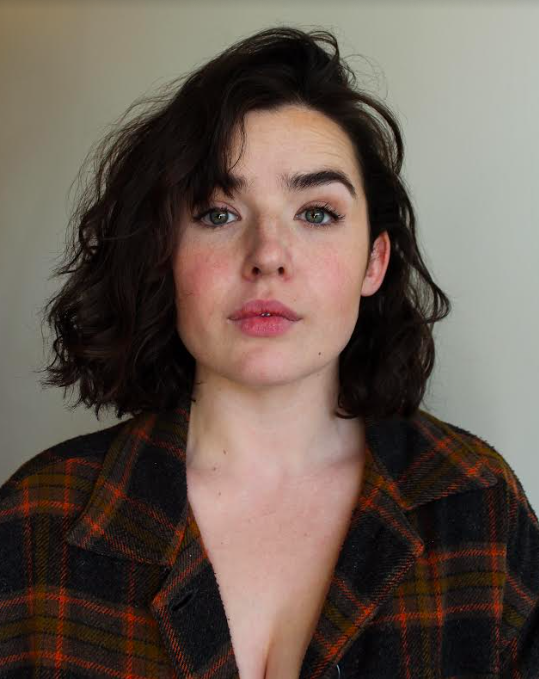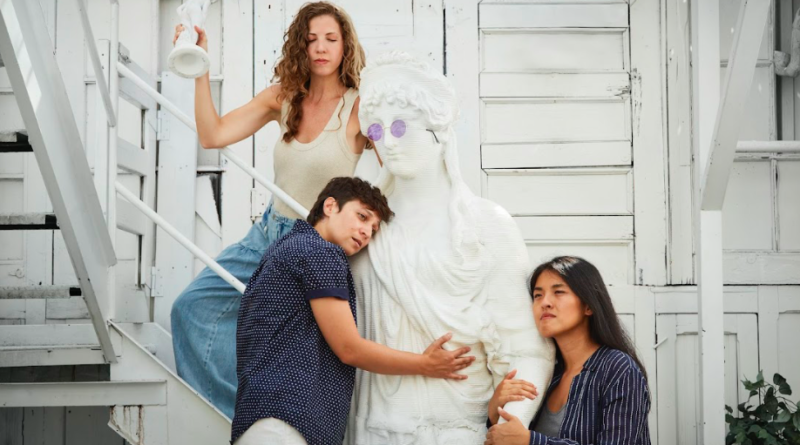INTERVIEW: Helen of Troy, told from her perspective
Photo: Helen. stars Jackie Rivera, Grace Bernardo and Lanxing Fu. Photo courtesy of Jeff Harris / Provided by Emily Owens PR with permission.
There’s a lot that has been written about Helen of Troy throughout the years, but few retellings of the tale are offered from her perspective. That changes with the new play Helen., written by Caitlin George and continuing through Oct. 29 at La MaMa in New York City. The production, directed by Violeta Picayo, tells the tale of three sisters — one of them being the title character, who eventually leaves her family in order to seek new adventures, but she struggles to leave their influence and orbit.
The show is billed as a funny, feminist take on the Helen of Troy myth, a dissection of the relationships between mothers and daughters. La MaMa co-presents the play with En Garde Arts, and The SuperGeographics serve as producers.
Recently George exchanged emails with Hollywood Soapbox. In the Q&A, the Australian playwright, who frequently explores issues of gender and society in her work, opens up about her inspiration for the project and how the story resonates with a 2023 audience. Questions and answers have been slightly edited for style.
How long have you been working on Helen.?
I began working on Helen. in February 2021. I was attending a residency with The SuperGeographics remotely, which was hell, but it meant I often became a fly on the wall for brilliant conversations between artists I deeply admire (including Violeta Picayo and Jonathan Taikina Taylor, both integral collaborators on Helen.). One of those conversations was about Helen of Troy and how we rarely see her story told from her own perspective. Instead, her story is framed from the perspective of, or with her motivation being, either Paris (her lover) or Menelaus (her husband).
The realization of Helen’s story as one of absence sparked a kind of inspirational rage. Two days later I had new pages, centering Helen around her sisters. Other figures of the Trojan myth, Klaitemestra and Timandra, whose actions in the myth directly affect one another in catastrophic ways, yet we rarely see them in a room together. Refocusing the epic tale of the war through the lens of the sororal, rather than romantic. Romance is great and all. But no one can love you harder or hate you more than your own sister; what’s more epic than that?
I sent the pages off to Violeta Picayo who I hoped would be excited by it. She called me up after reading them, hook-line-and-sinker-ed, and from that point the show has been developed by The SuperGeographics, with Violeta as director and me as playwright.
How closely does this stick to the Helen of Troy myth? It’s a radical departure from the original, right?
I wouldn’t call it a radical departure as such, but rather a radical reframing.
Rather than centering the story around the two opposing forces of the Trojan war — Greece; Menelaus; husband vs. Troy; Paris; lover — Helen leaves home because of neither. She leaves home simply because she wants to, to set out on a journey, to go on an adventure. She was not abducted by a thief; she did not have to escape an unhappy marriage. She simply makes a decision. And everybody gets upset.
Through non-linear accumulations of events following Helen’s departure, we see all the usual ‘big ticket’ items included in the story. The god Eris is causing Khaos, Menelaus and Agamemnon set out for war, Iphigenia is sacrificed so the Greek ships can make it to Tory, there is war, destruction, both sides lose heroes, Klaitemestra kills Agamemnon. But in this retelling, the epic events are contextualized inside the home relationships. We see the impact that Helen leaving home has on her sisters, especially, Klaitemnestra, whose daughter, Iphigenia, is sacrificed to help bless the war effort.
Rather than rehashing the myth as it is familiar to us, Helen. digs up the perspectives, relationships and stories which have been forgotten in myth and history.
It would seem that the themes you’re exploring in the play should / need to be heard in 2023. Do you feel this play speaks to today’s world?
Today’s world is built on the back of stories, culture, inherited from all who came before. We live under a sea of stories already told, of written history, and from them we draw inspiration for new ways to step toward into the future.
If you trace back story archetypes through a western lineage you can trace a direct line to ancient Greek myth. On the way there you’ll travel through the many hands, hearts and voices of (mostly) men, who have purposefully monopolized written history.
Telling, retelling, reframing the stories and histories of women from the perspective of women is vitally important in today’s world, adding to the sea of stories behind us and opportunities for the future. This play speaks directly to that need, using today’s cadence, with lightness, humor, and I hope, hope.
How would you describe the central character of Helen?
She runs, fast, without caution. She wants. She tries.
What has it been like working with director Violeta Picayo?
Violeta has been a dear friend, company mate and cherished collaborator for years now. When I started writing this play, I knew right away she’d be excited by it, and it was my hope to entice her into building it with me. Dreaming up this play with her has shaped the piece from start to (not quite yet) finish.
Violeta has a remarkable capacity to hold space for artists to throw themselves into and make bold choices, uplifting artists and differences in the room, offering questions rather than dictating answers. I’ve no idea how she does it, but the way she extrapolates image, texture, meaning from the text and bodies in space is remarkably generous, expansive and energizing. Her tireless energy towards the play has been the force which has carried it through its many different iterations, workshops, developments and readings.
In short, it is a privilege and a joy to be working with director Violeta Picayo.
How vitally important is it to theater to have groups like The SuperGeographics?
The best argument I’ve heard recently for the importance of theater companies like The SuperGeographics came from artistic director Jonathan Taikina Taylor, who says that, “The theater is one of the few places left that require we all, artists and audience, get in a room and deal with each other. On the night but also every day of rehearsal. Culturally, we’re in a moment of going to our corners, which can contribute to creating more distance between what is already different. What we need is a space where people from disparate communities can come together to reimagine ways of collaborating. It is vital to have grounded, yet idealistic, companies that are able to do the leg work of making equity possible. The SuperGeographics is an ambitious experiment of how to do that, to reach across the gaps and meet in difference through collision and collaboration.”
By John Soltes / Publisher / John@HollywoodSoapbox.com
Helen., written by Caitlin George, continues through Oct. 29 at La MaMa in New York City. Click here for more information and tickets.


